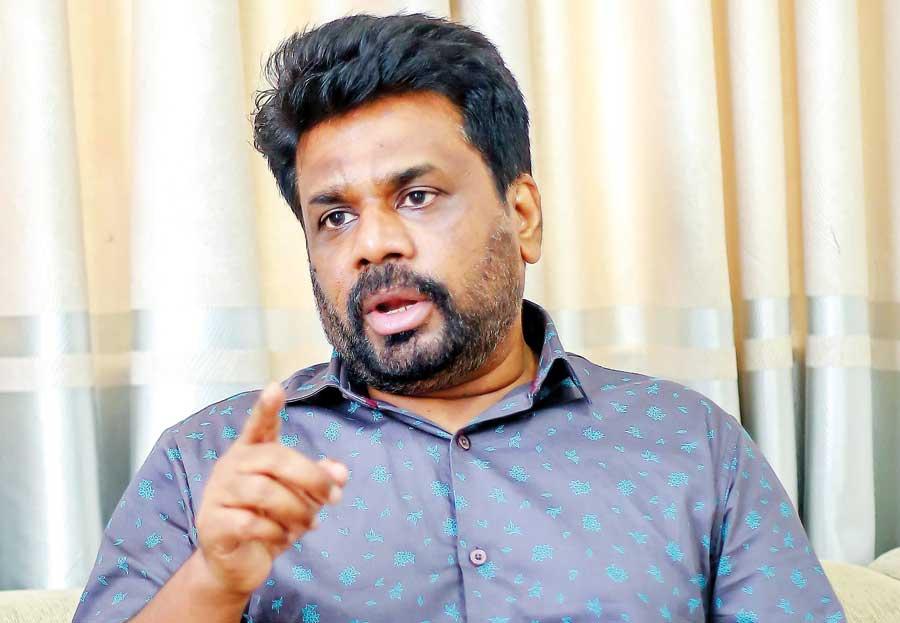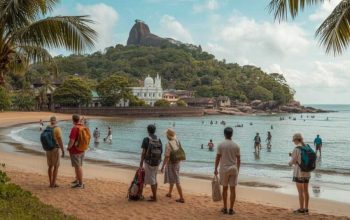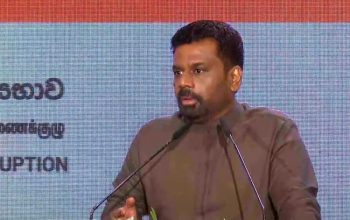Anura Kumara Dissanayake emerges as frontrunner for presidential poll
Party’s theme will be ‘Rich People, Rich Country’
Instead of nationalisation, private sector will play key role
In just 28 days, 2024 will dawn. Two foremost events the country will witness will be a presidential election and a parliamentary general election—both pledged in Parliament by President Ranil Wickremesinghe.
Colombo-based diplomatic missions, international organisations, study groups and even political parties have been busy in the past months placing their bets on surveys and opinion polls. Emerging as an unexpected frontrunner in the presidential race is Anura Kumara Dissanayake, a product of Kelaniya University, who celebrated his 55th birthday just a week ago, on November 24. Some surveys are pitching him as a possible winner with just over 51 percent of the votes. His protagonists, however, counter it with a mathematical theory. They say the Janatha Vimukthi Peramuna (JVP) won only 3.1% at the 2019 presidential election. Therefore, they argue, he would have to record a 1500% increase in votes.
In the United States with party supporters – Anura Kumara Dissanayake, Janatha Vimukthi Peramuna (JVP) leader in denim trousers and a jacket to keep him warm from the cold. JVP photo
“Politics is not mathematics. It is a social science. It may not sound realistic mathematically but according to social science it is possible,” counters Dissanayake, the JVP leader. Like the social change he expects, the JVP, which is the key player in the National People’s Power (NPP), he says, has changed in keeping with a new era. Until 1990s, there were two blocs—the socialists and the capitalists. We came from the former. Thereafter the world became United States centric. There are other powerful nations like China, Russia, India, and Europe. There is the Middle East. Therefore, we needed to change.
In a wide-ranging interview with the Sunday Times, Anura Kumara Dissanayake answered questions posed to him. Here are edited excerpts:
Q: In the backdrop of a difficult and challenging environment where the country remains bankrupt, the President has come up with a budget. What are your thoughts?
A: We have faced two issues. The Treasury could not raise the required rupee revenue and the country failed to earn the dollar revenue. We failed to earn the required dollars because we import some of the items which could be produced here. The other reason is we have failed to capture developed markets and services. We need an economic plan. We need a policy on substitutes for imports. We need a plan to capture developed markets and services in the world. But we do not see that plan in budget proposals. For the Treasury to raise revenue the goods and services should be increased. Without improving goods and services we cannot raise the revenue. We do not see any proposals towards achieving this.
I can cite some examples. The small and medium-scale businesses had collapsed. The government should have collected the information on these businesses through the Divisional Secretaries and found a solution. We do not see such a solution in the budget. The construction industry has suffered a major setback. There is no solution offered to salvage the construction industry. There is no concession for the multiday trawler fishermen who suffer losses. The coconut industry is another sector. We believe the production is not sufficient. We should have targets which could be achieved. Milk production is another area as the production is insufficient.
Again, in the service sector such as the IT industry we need to have a plan to enter the market. But we don’t have a plan. Therefore, President Ranil Wickremesinghe’s budget has no solutions. He believes that he could offer giveaways and gain votes. He has offered a salary increase for 1.3 million public sector employees, offered an increase of pensions for 700,000 pensioners and Aswesuma beneficiaries for another two million families. Therefore, it is clear he is collecting votes. The budget does not have any solution to come out from the present crisis.
Another main crisis the government is facing is in the power and energy sector. The Kelanitissa and Kerawalapitiya power stations and the new station at Kerawalapitiya collectively could produce 1000 MW. Diesel and naptha are being used but they can be converted to natural gas. A unit can be provided at Rs 32. There should be a plan for that. Also, roof-top solar power is another sector. Some 1000 Mw could be produced without increasing the generation capacity. This means the same transmission lines could transmit that capacity. That too needs a plan. Therefore, we do not believe that the power and energy sector crisis could be resolved by selling fuel stations. We see this as a budget to collect votes.
Q: By January next year, the President Wickremesinghe-led SLPP government will complete 18 months in office. The public perception is that there are no shortages of fuel, power, or cooking gas. He says the opposition did not offer any support to him. Do you agree?
A: We don’t agree. Firstly, the President should have a mandate from the people. This President does not have one. He too should be responsible for the economic crisis. The Supreme Court has already identified those who contributed to the economic bankruptcy. It is with the support of those people that the President is in power. How can we support such a person? Our proposal is that if a mandate from the people is received to form a government and if proposals are brought by that government, we have a responsibility to provide support.
Secondly, we receive gas and fuel not due to an economic miracle. In April last year, we declared bankruptcy and said we were not re-paying loans. We have foreign loans arrears amounting to US$ 3,750 million. The total outstanding is US$ 36 billion. So, it is not that the economy was revived and that we earned dollars. The purchasing power of the public has been reduced. If the economy is improving the demand for electricity should increase. But the demand has reduced. Usually we need 1.6 million units, but we have used around 1.5 million units this year. That means that factories can be closed, and consumption could be reduced, and the electricity could be managed. The consumption of fuel could be reduced, and fuel could be provided. The usage of electricity and power should increase if the economy is improving as it is an indicator. The President has said if we must start repaying the loans from January the economic situation will get worse. Our stand is that the government should have a mandate from the people.
Q: What would be your major campaign slogan for a future election?
A: ‘Pohosath Janathawak – Pohosath Ratak’ (A rich people –rich country) We should have a corruption-free country with democracy in place. Today we do not have economic democracy. Today people can carry out business activity with the only if they have contact with the Minister. An investor can get land only if he knows the Lands Minster. A government tender could be obtained only if he is supportive of the government. That is a hindrance to economic development. Therefore, our effort is to restore economic democracy. We do not want to put up hotels, own distilleries, buy shares from companies or get into the mining business. We will create an opportunity for an entrepreneur or industrialist to reasonably participate in economic development.
Q: Do you believe a fragmented opposition can pose a formidable threat to the government at an election?
A: The fragmented groups have been those who were together at one time. For instance, the Dullas Allahapperuma faction was with the Rajapaksas. The Anura Priyadarshana Yapa faction was also with the Rajapaksas. The SJB was with Ranil Wickremesinghe. They broke away not due to policy differences. The SJB was formed not by questioning Wickremesinghe’s economic policies or his political culture. There was an opinion at that time that they could not win with Ranil. They believed they could win with Sajith Premadasa. That was the reason for the formation of that camp. The people who joined Sajith were those who thought they could enter Parliament if they came with him, instead of joining Ranil. The reason for the breakaway of Dullas and the group was due to personal differences with the Rajapaksas. If they were taken into the inner circle the results would differ. Earlier they were in the inner circle. Therefore, there are no policy reasons for the breakaway.
Q: There have been increased engagements by the JVP with the international community. You have engaged key players like the United States, India, and other European nations which you criticized heavily earlier. Was the change on your initiative or theirs?
A: We are a sovereign and independent country. Therefore, we have the acceptance and the right. That is the principle. But there is a difference between the principle and the reality. Whether we like it or not there is geopolitical competition. There is competition in trade, technology, etc. In Sri Lanka, we are not part of that competition. We are not competitors of India, China, Russia, or Europe. They have the competition. Our neighbour India is in the geopolitical competition. That is the reality. Our country’s decisions favour or disfavour India. Therefore, in our foreign policy, we cannot ignore India.
Q: On the present impasse between the Presidency and the Constitutional Council:
A: Of the 78 years since independence, 45 years have been under the Executive Presidential system. It does not suit our country. Our leaders are not mentally conditioned to hold office. Why do they use the power to offer presidential pardon to release those convicted of murder? The President has the power to appoint judges. But there is a question of how a person from a local bank was appointed to the office of Chief Justice. I am referring to Mohan Peiris, onetime Chairman of Seylan Bank. He was appointed after Shirani Bandaranayake was removed. The power to appoint persons to the judiciary has been given to the President believing that he would use his wisdom in the right manner. We feel the Executive Presidential system has been used to take control of the judiciary, the legislature, and the executive. Politically our stance is that the Executive Presidential system should be abolished. Former President Maithripala Sirisena said he released Jude Jayamaha, convicted for murder, because Ven Athureliye Rathana Thera asked him. He told that to me. But that is not the manner a President should act. Even those in the judiciary lost confidence. We need constitutional reforms. But not just legal reforms. The attitudes too should change. It is not that we are short of laws, but there is also an issue of attitudes. We are a country which has good attitudes. But that was destroyed by this political culture.
Q: On the Supreme Court ruling that three members of the Rajapaksa family and a coterie of officials contributed to the economic bankruptcy:
A: If they were responsible for the economic downfall, they have also committed an offence under criminal laws. Action could be filed under these laws. We will be doing that. But we believe that fraud, corruption, and wastage were more serious. Those were not taken into consideration in this case. We believe that these areas should also be considered, and action taken.
Q: Colossal expenditure on retired presidents and provision of security for those who face no threats have cost the government a vast amount in public funds. Do you hope to continue such a practice?
A: I have been in Parliament for the past 23 years and have never taken a policeman for my security. Therefore, we will remove VIP security where they are not required. We will not provide security to open the door for the MP, to go marketing for the MP’s wife and to prepare tea for their visitors. There are many vacancies in the Police while a large number have been deployed to protect VIPs.
We will stop maintaining former Presidents. We will also stop providing houses for Ministers and paying their electricity bills. We believe that the President can have only one official residence in Colombo.
We know that some court cases involving corruption have been withdrawn for minor technical reasons. Many bribery cases have been withdrawn on the grounds that all three Commissioners have not signed the papers. Many were discharged not after hearing of the case, but by considering if the case was filed properly or not. These cases should be filed again. The case of a ruling party politician regarding property at Malwana (he mentions the name). The case was withdrawn on the grounds that the Attorney General would not be calling further witnesses. If witnesses are not called, you cannot proceed in a case. Most cases have been withdrawn due to political intervention. We will refile these cases. There are cases which have not been filed. The investigations have been completed by the CID and the file is with the AG’s Department. We do not want to take revenge personally. But they should be held responsible as the issues involve public funds.
Q: There have been fears that a government under your party will go on to acquire private properties and business establishments. What is your official position?
A: There is an opinion being built that an NPP government is against those who have wealth, and that the property of the wealthy will be acquired. That is not correct. We don’t have such plans. We believe that the engine of economic growth will be the small and medium-scale industrialists and private entrepreneurs. As a government, we will not engage in business. But to direct the economy, we will ensure that there is economic democracy and targets will be provided to the private sector. We would say the tourism sector should achieve a particular target in five years. The social responsibility mandate is with the government. The private entrepreneur has no mandate to take responsibility. His target is profits. That is nothing wrong. But the Government has a social responsibility. According to that mandate the economy should be directed. For instance, we should give a direction that in two years’ time we should reach a target of four million tourist arrivals. The hotels required, guides, vehicles should be provided by the private sector. We should set a target and get the private sector to achieve it. In the tea industry we should go for further value addition. Currently 72 percent of the tea is exported as bulk. We should give directions to increase value addition. But that does not mean we will be opening tea factories. We will invite the business sector to invest
from the Sunday Times






